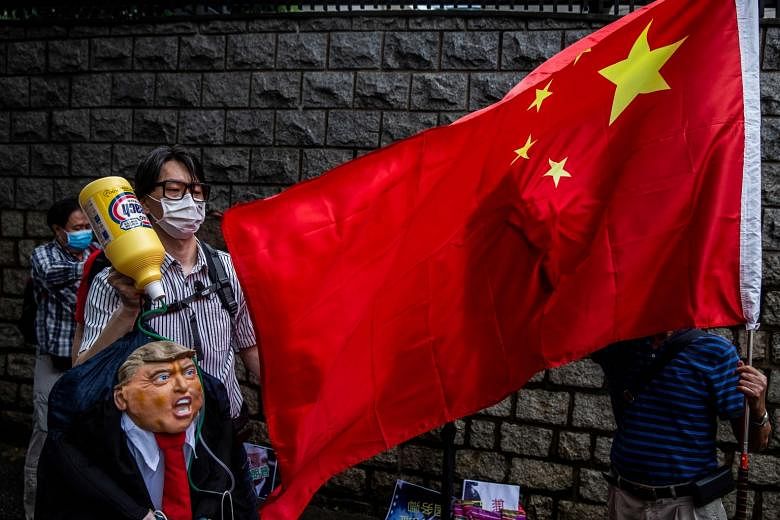WASHINGTON - Just as unfair trade and illegal immigration from Mexico were key rallying cries in 2016 for then presidential candidate Donald Trump, who tapped into longstanding grievances, China is the new spectre in the 2020 presidential campaign.
But while tapping into a vein of fear of foreigners or foreign powers surfaces periodically in American life and politics, there are also fundamental differences.
Mexico is not a strategic rival to the United States. China is. And this time, there is bipartisan agreement that China represents a threat to US global dominance.
While the Democratic Party is flaying President Trump for his administration's response to the coronavirus pandemic - which, as of yesterday morning in the US, had killed more than 102,000 people - it is also trying to sound equally tough on China.
And the ground is fertile. Public perception of China in America has turned steadily negative under the 3 ½ years of the Trump administration.
President Trump's response to China's new national security law to cover Hong Kong is just part of a wider pushback against China, in line with the administration's identification in its 2017 National Security Strategy (NSS) of China as a strategic competitor.
Chinese President Xi Jinping's grand strategy is to "achieve a favourable set of rules and a Sino-centred security architecture", Dr Patrick M. Cronin and Mr H.R. McMaster, the Asia-Pacific security chair and Japan chair respectively at the conservative Hudson Institute, wrote in a paper released on Friday (May 29).
Mr McMaster is a former general who, as President Trump's then National Security Adviser, oversaw the 2017 NSS.
"Beijing wants to wield a veto over military and economic decisions while displacing the US alliance system and neutralising any latent coalition that could prevent it from getting its way, whether over forcible unification with Taiwan or coercion of its maritime neighbours," they wrote.
The best option for the US was to strengthen its alliances with other regional powers like Japan and South Korea, they said.
Hawks in Congress have, meanwhile, been passing a stream of legislation aimed at limiting China's reach and influence in the US, and punishing Chinese officials involved in China's actions in Tibet, Xinjiang and the South China Sea.
The US has put pressure on allies to reject 5G technology from Chinese telecom giant Huawei.
And it has given its Committee on Foreign Investment in the United States more powers to scrutinise and reject Chinese investment in potentially sensitive technology sectors.
The US is also suspending visas for mostly doctoral and post-doctoral Chinese students deemed to "operate as non-traditional collectors of intellectual property".
Mr Trump is "dismantling China's ability to use graduate students to steal intellectual property and technology from the United States", the White House said in a one-page brief on Friday.
"China's theft of American technology, intellectual property, and research threatens the safety, security and economy of the United States," the White House document said. "President Trump is ensuring that our nation remains militarily and technologically dominant."
"We understand that China is a strategic competitor," State Department spokesman Morgan Ortagus told The Straits Times.
"That doesn't mean that we won't have plenty of areas in which we can work together," she insisted.
"We have worked together on... North Korea. We still have a lot of American businesses that are doing business in China. We have the President's phase one trade deal. So nothing in foreign policy is ever black and white."
For Mr Trump, the immediate concern, looming large, is the Nov 3 election.
Before the coronavirus pandemic landed in America, the economy was booming. Mr Trump could claim his trade war on China forced Beijing to sign a new phase one trade agreement in January, which secured better terms for the US.
Pundits were reluctant to dismiss the idea of Mr Trump getting re-elected, especially as an incumbent with a strong economy has an inherent advantage.
The pandemic upended that.
For President Trump, blaming the World Health Organisation and China deflects and channels anger and frustration as Americans struggle under record unemployment.
The direction of the China-US relationship remains "precipitously negative on pretty much every front, and there are a lot of them", Dr Ian Bremmer, chief executive of political risk consultancy The Eurasia Group, told The Sunday Times.
Yet, President Trump on Friday did not mention the phase one trade deal, or go after President Xi personally, Dr Bremmer noted. "For now, this is still incremental escalation, even though the rhetoric is extremely sharp."
But, he cautioned, "We've still got a number of months to go before the election."


